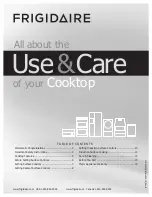
15
IMPORTANT
Before you call for service,
review this list. It may save you time and expense. The list includes common
occurrences that are not the result of defective workmanship or materials in this appliance.
OCCURRENCE
POSSIBLE CAUSE/SOLUTION
Entire cooktop does
not operate.
House fuse has blown or circuit breaker has tripped. Check/reset breaker or replace fuse. If
the problem is a circuit overload, have this situation corrected by a qualifi ed electrician.
Service wiring not complete. Contact installation agent or dealer.
Power outage. Check house lights to be sure. Call local electric company.
Surface element
does not heat.
No power to appliance. Check/reset breaker or replace fuse. If the problem is a circuit
overload, or improper connection of the armored cable supplied with the appliance, have
this situation corrected by a qualifi ed electrician.
Too low heat setting. Turn control to a slightly higher setting until element comes on.
Incorrect control is on. Be sure to use correct control for the element to be used.
No cookware was placed on the induction cooking zones or the cookware material type is
incorrect for induction cooking.
Surface element
too hot or not hot
enough.
Incorrect control setting. Raise or lower setting until proper amount of heat is obtained. Dial
markings are an indicator of relative heat settings and will vary slightly.
Lightweight or warped pans being used. Use only fl at, evenly balanced, medium or
heavyweight cookware.
Voltage is incorrect. Be sure appliance is properly connected to the specifi ed power source.
Use only fl at bottom, evenly balanced, medium or heavyweight cookware. Pans having a fl at
bottom heat better than warped pans. Cookware material affects heating. Heavy and medium
weight pans heat evenly. Because lightweight pans heat unevenly, foods may burn easily.
Food not heating
evenly.
Improper cookware. Select fl at-bottomed cookware of a proper size to fi t element.
Incorrect control setting. Raise or lower setting until proper amount of heat is obtained.
Scratches or
abrasions on ceramic
glass cooktop
surface.
Coarse particles (such as salt or sand) are between cooktop and utensil. Be sure cooktop
surface and bottom of utensils are clean before use. Small scratches do not affect cooking
and will become less visible with use.
Cleaning materials not recommended for glass ceramic cooktop have been used. See
Ceramic-Glass Cooktop
section in this Owner’s Guide.
Cookware with rough bottom has been used. Use fl at-bottomed, smooth utensils. See
Selecting Surface Cooking Utensils
in this Owner’s Guide.
Metal marks on
ceramic glass
cooktop surface.
Sliding or scraping of metal utensils on cooktop surface. Do not slide metal utensils on
cooktop surface. Use a mildly abrasive cleanser to remove marks.
Brown streaks and
specks on ceramic
glass cooktop
surface.
Boilovers have cooked onto surface. Use razor blade scraper to remove soil. See
Ceramic-
Glass Cooktop
section in this Owner’s Guide.
Cleaning materials not recommended for ceramic-glass cooktop have been used. Use
recommended cleaners and cleaning method. See
Ceramic-Glass Cooktop
section in
this Owner’s Guide.
Areas of
discoloration on
ceramic glass
cooktop surface.
Mineral deposits from water and food. Wet surface with water and sprinkle on a cooktop
cleaning creme. Scrub with a clean damp paper towel until the stain disappears. Wipe
remaining paste away, then apply a small amount of cooktop cleaning creme and polish
with a clean paper towel. Use cookware with clean, dry bottoms. See
Ceramic-Glass
Cooktop
section in this Owner’s Guide.
BEFORE YOU CALL
(Solutions to Common Problems)


































